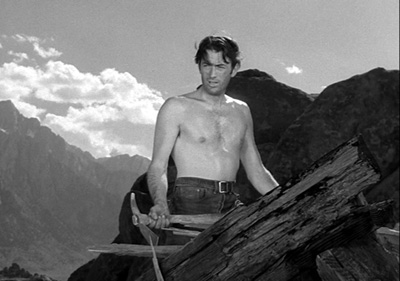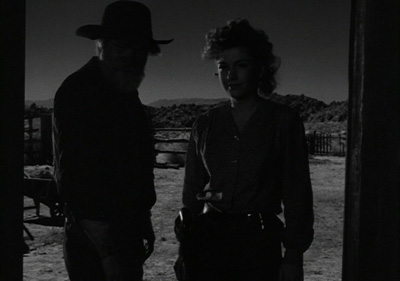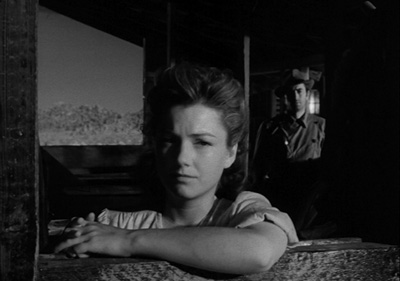I’ve been on a big Gregory Peck kick as of late, which after four years or so, I’d say I’ve waited long enough. I’ve always read a lot of reviews where people complain that he’s somewhat of a “wooden” actor. I’ve never thought that about him, but I can understand where people are coming from. He has that stoic, clipped manner of speaking and what other people take as wooden, I take as calm and collected. To each his own though.

But for those people who do find him “wooden”, I’d highly recommend William A. Wellman’s 1948 western, Yellow Sky, where he’s anything but. He’s dangerous and sexy, while Anne Baxter matches him moment for moment. Its plot revolves around a gang of bank robbers that make their way through the desert, only to wind up in a deserted town called Yellow Sky. Soon after, they meet its only inhabitants, a woman nicknamed Mike and her Grandpa. However, when the gang realizes the two are hiding gold, they decide to make quick fortune by robbing them.
For all the William A. Wellman movies I’ve seen, this quickly became one of my favorites. Not only is it a solid western, but the relationship between “Mike” (Anne Baxter) and “Stretch” (Gregory Peck) is fascinating. Yellow Sky isn’t just a western–it’s a psychological one. Hands down Anne Baxter’s characterization of Mike steals the show here. Yes, she’s mainly known as the backstabbing bitch in All About Eve, but in Yellow Sky, she shows a great range of emotion. It’s sounds a bit trite, but Mike wants to prove that she’s just as tough as one of the guys, even favoring a men’s nickname instead of using her real name, Constance Mae. She lives by her own strict moral code. And while Mike is a tomboy, she’s a Hollywood tomboy. Petite in size, her hair is neatly coiffed and even though she spends the entire film in a non-nonsense blouse and black jeans, they show off her best assets. It’s no wonder that she elicits lust in most of the gang.
Since they’re the focus of the story, the main relationship is between Mike and Stretch. While Mike hates all the men, it’s Stretch that she seems to hate the most. Gregory Peck is fantastic in this role (but then I love when he plays bad boys). He constantly pursues Mike despite warning all the other men in his gang to stay away from her and Grandpa (John Russell). It’s almost as though he feels he has first dibs on her because he’s their leader. In their first meeting, Stretch asks her what she’s so afraid of, to which Mike defiantly answers, “Nothing.” It’s a lie of course, but there’s no way Mike can show any other emotion besides “tough.” She feels that even the slightest hint of femininity would be a sign of weakness and with the six men who just intruded their lives, Mike intends to be just as tough as them.
 In addition to giving Stretch a mean right hook when he attempts to steal her rifle, she’s ready to shoot anyone at a moment’s notice. But what’s nice about the character of Mike is that she’s not a caricature of a tomboy. For example, she isn’t anything like Doris Day in Calamity Jane. Wellman was smarter than that. In less assured hands, the character of Mike could have easily been one to laugh at. You take Mike seriously because she is serious and Anne Baxter manages to bring her to life in a wonderful way. There’s nothing humorous about her. You don’t doubt for a second that Mike’s first instinct would be to shoot a man right below the belt. The only person she cares about is her Grandpa and she’d fight to the death to keep him safe. Her loyalty towards him isn’t just because he’s her Grandpa, but because he treats her with respect. In a conversation, he proudly tells Stretch that not only is Mike as “tough as a nut”, but that she was raised by Apaches. In so many westerns, anyone who is raised by Indians is immediately treated as though they have the plague. Not only do Grandpa and Mike have a good relationship with the Apaches, but Mike has turned out to be a real fighter. Her Apache upbringing is a source of pride, not shame, for him.
In addition to giving Stretch a mean right hook when he attempts to steal her rifle, she’s ready to shoot anyone at a moment’s notice. But what’s nice about the character of Mike is that she’s not a caricature of a tomboy. For example, she isn’t anything like Doris Day in Calamity Jane. Wellman was smarter than that. In less assured hands, the character of Mike could have easily been one to laugh at. You take Mike seriously because she is serious and Anne Baxter manages to bring her to life in a wonderful way. There’s nothing humorous about her. You don’t doubt for a second that Mike’s first instinct would be to shoot a man right below the belt. The only person she cares about is her Grandpa and she’d fight to the death to keep him safe. Her loyalty towards him isn’t just because he’s her Grandpa, but because he treats her with respect. In a conversation, he proudly tells Stretch that not only is Mike as “tough as a nut”, but that she was raised by Apaches. In so many westerns, anyone who is raised by Indians is immediately treated as though they have the plague. Not only do Grandpa and Mike have a good relationship with the Apaches, but Mike has turned out to be a real fighter. Her Apache upbringing is a source of pride, not shame, for him.
There are plenty of interesting scenes and one of them occurs at the watering hole, which is to be a source of trouble for Mike. After being accosted by the men, Stretch steps in and tells them to stay away from her and Grandpa. Immediately, Mike rewards him with a look of tenderness. It’s the first real emotion (besides anger) that we see from her. Is it because she sees Stretch respects not only her, but her Grandpa as well?
However, Stretch refuses to take his own advice and treks over to the house to see Mike. After tackling her to the ground and kissing her, Mike repeatedly headbutts(!) him and tells him “You stink!”, but not before wiping her mouth as though his kisses were poison. It’s interesting to see that Mike’s first reaction after physical violence is to verbally assault him. It’s a one-two punch of hitting him below the belt. She then ends their “rendezvous” by shooting at his head–although she aims to miss. Later, when she and Grandpa are  walking back to the house, Mike tells him, “He made me feel..I don’t know.” But she does know. Mike has made her feel like a woman for the first time in her life. Wellman then cuts to Mike’s room, in which a picture of an elegantly dressed lady is pinned onto her wall. Seeing it fills her with disgust and causes Mike to angrily tear it into pieces. It’s a great moment of self-loathing–she hates herself for feeling something that she’s been trying so hard to suppress. Although having such a picture on her wall in the first place clues us into the fact that Mike longs to be as pretty as any other woman out there. In that one short scene, we sense Mike’s vulnerability for the first time. It’s easily one of my favorite scenes in the entire movie.
walking back to the house, Mike tells him, “He made me feel..I don’t know.” But she does know. Mike has made her feel like a woman for the first time in her life. Wellman then cuts to Mike’s room, in which a picture of an elegantly dressed lady is pinned onto her wall. Seeing it fills her with disgust and causes Mike to angrily tear it into pieces. It’s a great moment of self-loathing–she hates herself for feeling something that she’s been trying so hard to suppress. Although having such a picture on her wall in the first place clues us into the fact that Mike longs to be as pretty as any other woman out there. In that one short scene, we sense Mike’s vulnerability for the first time. It’s easily one of my favorite scenes in the entire movie.

What makes Yellow Sky so interesting is how the relationship between Mike and Stretch progresses. It’s not a full blown love affair–there are things that Stretch does and says that are questionable–yet it’s enough to gain Mike’s trust. Stretch is the first man besides her Grandpa to treat her with a respect. He doesn’t look down at her. It’s clear that even after their first kiss (albeit a forced one), Stretch is bothered enough by Mike’s disgust, that he appears the next day wearing a fresh shirt while his face is clean shaven. Upon seeing his efforts to impress her, Mike’s facade begins to crumble.
 While the relationship between Mike and Stretch grows, the one between her and the rest of the gang is precarious. When she goes down to the watering hole a second time, she’s physically attacked by Lengthy (John Russell) while Half Pint (Henry Morgan) and Walrus (Charles Kemper) cheer him on, with the latter yelling, “Ride her cowboy, ride her!” It’s a particularly disturbing scene, especially for 1948. Since the code was in effect, the most you see is Lengthy pushing Mike against a tree while she tries to beat him away. But it’s clearly a prelude to rape. It’s even more disturbing when Walrus tells Stretch afterwards that she was asking for it. This scene also lets you know that Lengthy sees right through Mike’s tough act. He doesn’t see her as an equal. For Lengthy, she’s just another woman to take advantage of.
While the relationship between Mike and Stretch grows, the one between her and the rest of the gang is precarious. When she goes down to the watering hole a second time, she’s physically attacked by Lengthy (John Russell) while Half Pint (Henry Morgan) and Walrus (Charles Kemper) cheer him on, with the latter yelling, “Ride her cowboy, ride her!” It’s a particularly disturbing scene, especially for 1948. Since the code was in effect, the most you see is Lengthy pushing Mike against a tree while she tries to beat him away. But it’s clearly a prelude to rape. It’s even more disturbing when Walrus tells Stretch afterwards that she was asking for it. This scene also lets you know that Lengthy sees right through Mike’s tough act. He doesn’t see her as an equal. For Lengthy, she’s just another woman to take advantage of.
However, it has to be noted that the youngest member of the gang, Bull Run, (Robert Arthur) does respect Mike. When he sees Lengthy attacking her, he’s the only one to step in and pull him off, only to need saving by Stretch in the end. In some respects, both Bull Run and Stretch are somewhat alike. While they try to keep up their tough facades, their basic sense of decency hasn’t been corrupted yet and after such a particularly brutal scene, it’s refreshing to see. The only difference is that Bull Run is naive to the ways of the world, while Stretch has seen it all and is wise to the ulterior motives of his gang. This certainly affects the fates of their characters at the end of the movie.
 The relationship between Stretch and Dude (Richard Widmark) is probably second to that of Mike and Stretch. When Dude sees that Stretch is falling for Mike, he knows that he’s of no use to the gang anymore. Women mean absolutely nothing to Dude. He was burned by an old girlfriend in the past and he’s nothing but bitter towards them now. Not only does he make numerous attempts to overthrow Stretch as their leader, but he’s also a silent witness to many moments where both Mike and Stretch let their guards down. He revels in their downfalls, knowing that the more Stretch becomes emotionally attached to Mike, the sooner he can make off with the gold. Greed is Dude’s only motivation in life. He and Lengthy are both soulless in their pursuit for the gold and when Stretch finally backs out of a deal that would wipe out Mike and Grandpa for good, the gang finally turns on him. It’s interesting to see that Mike is the only one who immediately tries to protect him. As the gang attempts to shoot him down, Mike covers him, therefore risking her own life so they can make their way back to the house together. It’s a nice twist, especially seeing the malevolence she had towards him when they first met.
The relationship between Stretch and Dude (Richard Widmark) is probably second to that of Mike and Stretch. When Dude sees that Stretch is falling for Mike, he knows that he’s of no use to the gang anymore. Women mean absolutely nothing to Dude. He was burned by an old girlfriend in the past and he’s nothing but bitter towards them now. Not only does he make numerous attempts to overthrow Stretch as their leader, but he’s also a silent witness to many moments where both Mike and Stretch let their guards down. He revels in their downfalls, knowing that the more Stretch becomes emotionally attached to Mike, the sooner he can make off with the gold. Greed is Dude’s only motivation in life. He and Lengthy are both soulless in their pursuit for the gold and when Stretch finally backs out of a deal that would wipe out Mike and Grandpa for good, the gang finally turns on him. It’s interesting to see that Mike is the only one who immediately tries to protect him. As the gang attempts to shoot him down, Mike covers him, therefore risking her own life so they can make their way back to the house together. It’s a nice twist, especially seeing the malevolence she had towards him when they first met.

It’s another facet that makes Yellow Sky so interesting to watch–the gender lines become blurred when it comes to Mike and Stretch. In two separate, but pivotal scenes (the rape scene and the aforementioned shootout), they both save each other from possible death. Unlike most westerns, Mike’s character doesn’t suddenly turn into that of “damsel in distress.” If anything, it’s Stretch who becomes the damsel! Once he falls in love with Mike, therefore respecting her, his gang loses respect for him. Without Mike’s protection, he would be a dead man since it’s hard to fight when there are five against one. The roles have reversed and it’s an interesting path for Wellman to go down, but it’s certainly one that he treaded down before. Although the genres and situations are different, his 1937 film, A Star is Born is another movie that has similar gender relations. The up-and-coming actress (Janet Gaynor) becomes a star, while the once-famous husband (Fredric March) is reduced to the role of Mr. Vicki Lester. In order to save him, she must give up her own career and she doesn’t do it because she has to–she does it because she loves him. Yet, the literal death of her career becomes a figurative one for him. It’s heartbreaking to watch and for a director that was nicknamed, “Wild Bill”, he certainly had a sensitivity for relationships and how they work.
While Yellow Sky is a rough western with a love story thrown in, it’s not too sappy. In fact, it’s presented in such a way that you think Stretch is saving Mike from herself. Audiences back then may have thought that all Mike needed was the love of a good man to change her mind, but there’s so much more to it than that. It’s the proof in the final scene (which I hate to spoil, since it’s so good) that Mike saved Stretch from himself as well. The building of their whole relationship was based on seeing each other as equals and in the end, that’s exactly what they are. Love saves the day and all that sappy stuff notwithstanding. They saved each other from themselves by letting their facades down and admitting that they needed love. What’s that old saying–No man is an island? I think it applies here perfectly.
It’s a shame to see that despite a dvd release, Yellow Sky isn’t that well-known today. Especially when you compare it to Gregory Peck’s other bad boy western, 1946’s campy Duel in the Sun. While the basis of that was a soap opera-type love story, Yellow Sky is so much more than just a love story between Mike and Stretch. It’s about the survival and relationships between people, no matter what the odds are against them. And that’s always a timeless topic.
